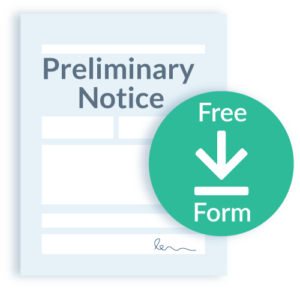Private projects
General contractors are not required to send notice on private projects.
“Levelset takes something that is pretty complex and makes it easy.”
General contractors are not required to send notice on private projects.
General contractors are not required to send notice on public projects.
Since GCs will not make a claim against their own bond for non-payment, they do not have bond claim rights, and have no preliminary notice requirement.
Subcontractors and suppliers aren't required to send preliminary notice on private projects.
Subcontractors and suppliers are not required to send preliminary notice on public projects.
It depends. Preliminary notices are generally not required in Maine. However, there are specific situations in which a preliminary notice can either protect a lien claimant’s rights that may not otherwise be protected, or help a lien claimant prove the owner’s consent.
While not specifically required by Maine law, notice may be filed in the Registry of Deeds in order to preserve the lien claimant’s lien against a subsequent bona fide purchaser for value. If this notice is not given, (or an action to enforce the lien has not commenced) a purchaser of the property will take the title of the property free of the lien.
On owner-occupied residential projects (including commercial, business, or industrial projects where the owner resides on the premises) a lien claimant may, but is not required to, serve a preliminary notice on the owner of the property. While this notice is voluntary, it may serve two important purposes:
1) in Maine, a lien claimant is required to prove that a property owner had knowledge of, and consented to, the labor or materials furnished, providing the property owner with this notice can accomplish this (this notice may be provided on any project to accomplish this goal); and
2) in Maine, unless notice is given, the property owner is only liable to pay amounts still due to the general contractor; that means that if the owner has already paid the general the full contract amount the lower-tier lien claimant is out of luck.
The notice to protect one’s claim as to a bona fide purchaser for value, should be filed in the Registry of Deeds as soon as possible after commencement of work, in order for maximum protection of the claimant. This notice must be refilled every 120 days to remain effective. Notice on owner-occupied residential projects should likewise be given as soon as possible in order for maximum protection of the claimant. Since the lien amount is limited to the amount still due to the general contractor at the time the notice is received or the lien is filed, whichever is earlier, it is best practice to send this notice as soon as possible.
If the notice to protect the lien claimant’s claim as to a purchaser is not filed (or re-filed) prior to the sale of the property, the new purchaser takes the title to the property free of the lien. Failure to file this notice has no bearing on the validity of any subsequently filed lien, however. The late sending of a notice to owner on an owner-occupied residential project may or may not affect the lien. This is not a required notice, so there is no statutory penalty for not providing this notice. If the property owner has paid the general contractor, however, the lien claimant’s lien may be limited to the amount still due to the general contractor, if any.
The notice to protect one’s claim as to a bona fide purchaser for value should be filed in the Registry of Deeds. The notice to owner on an owner-occupied residence should be “given” or “provided” to the property owner. No specific method of providing the notice to the owner is provided by Maine law so the notice may be given to the owner by any method. It may be best practice, however, to send the notice by certified mail.
The notice to protect one’s claim as to a bona fide purchaser for value should be filed in the Registry of Deeds. The notice to owner on an owner-occupied residence must only be provided to the owner.
Notices are generally considered delivered when sent, and considered recorded when recorded.
No. Maine does not require any preliminary notice to preserve a claimant’s right to make a bond claim.
N/A
N/A
N/A
N/A
A mechanic’s lien arises when the labor or materials are supplied. The lien is automatically dissolved, however, unless the supplier records a Notice of Lien in the registry of deeds in the county where the construction project is located within 90 days after the date of last work or materials supplied. Any supplier that has a contract with the owner of the property, however, is exempt from this requirement. In either event, to preserve the lien, a supplier must file within 120 days of the date of the last labor, services, or materials being provided, a complaint in the county or district court division in which the construction project is located. Additionally, a certificate from the clerk of court in which the action is pending, or an attested copy of the lien complaint, must be filed in the registry of deeds within 60 days of the day on which the lien complaint was filed.
This is a complicated and detailed process. It typically makes good sense to hire an experienced Maine attorney to guide you through the process.
In Maine, the proper parties that may file a mechanics lien or are given mechanic lien protection are those that, "performs labor or furnishes labor or materials" to the construction, alteration, repair, or moving of a building. Specifically, parties that are included in these protections include surveyors, architects, engineers, real estate licensees, landscapers, and sellers of land/improvements or structures. Equipment lessors and parties that provide equipment parts are also included. In Maine, there is no limitation on which tiers of a project (subcontractors, etc.) may file a mechanics lien. Therefore, if you fall within any of the previous descriptions of qualified parties, you may file a mechanics lien to prompt payment you are owed.
Keep in mind that you can file a Notice of Intent (NOI) to Lien form, although they aren't required by the state of Maine, the form is very successful at prompting payment without having to take the next step of filing a lien. If a party refuses to pay your claim or ignores your calls, sending an NOI to that party will let them know that you're serious about collecting your payment. The NOI gives the parties that owe you money one final chance to pay, and the form advises the parties involved that a lien will be filed if payment is not received within 10 days.
I hope that helps!
Preliminary notices are not generally required in Maine. However, there are a few instances in which a preliminary notice can significantly help protect mechanics lien rights. While not specifically required by Maine law, notice may be filed in the Registry of Deeds in order to preserve the lien claimant’s lien against a subsequent bona fide purchaser for value. If this notice is not given, (or an action to enforce the lien has not commenced) a purchaser of the property will take the title of the property free of the lien. Further, by serving a Notice of Intent to Lien on the property owner on an owner-occupied project, a participant is able to make Maine a “full-price” lien state, rather than an “unpaid balance” lien state as it is if no notice is given.
On owner-occupied residential projects (including commercial, business, or industrial projects where the owner resides on the premises) a lien claimant may, but is not required to, serve a preliminary notice on the owner of the property. While this notice is voluntary, it may serve two important purposes: 1) in Maine, a lien claimant is required to prove that a property owner had knowledge of, and consented to, the labor or materials furnished, providing the property owner with this notice can accomplish this (this notice may be provided on any project to accomplish this goal); and 2) in Maine, unless notice is given, the property owner is only liable to pay amounts still due to the general contractor; that means that if the owner has already paid the general the full contract amount the lower-tier lien claimant is out of luck.

First, download the generic preliminary notice form. The generic notice works in Maine and any other state that doesn’t require a preliminary notice. It provides the paying parties with details about your company.

Next, fill out your preliminary notice form. Make sure the information you include is correct and accurate–making a mistake when preparing the form could cause payment issues when the project ends.

Since Maine doesn’t require a preliminary notice, there are no regulations for delivery. Deliver your notice however you see fit.
Select Preliminary Notice document.
Provide basic job information.
Levelset sends the document for you. Postage included!